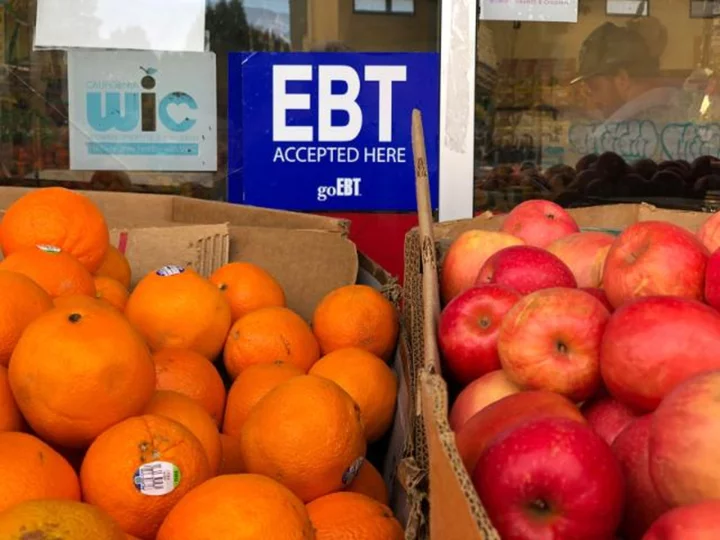After clamping down on food stamps in the debt ceiling deal, House Republicans now want to take a whack at WIC, the food assistance program for low-income women, infants and young children.
GOP lawmakers have proposed curtailing funding for WIC in the chamber's version of the US Department of Agriculture's annual spending bill. The legislation could force some families to wait for aid for the first time in years, as well as limit their ability to buy fresh fruits and vegetables.
It's among the party's latest efforts to cut federal spending by limiting benefits, reducing enrollment and adding work requirements to the nation's safety net.
However, some of the cuts, as well as a controversial provision related to abortion, left House Republicans unable to pass the spending bill on Thursday before members left for a six-week break. In addition to agriculture, the legislation also funds the Food and Drug Administration and other related agencies.
Even though the appropriations subcommittee that crafted the bill is led by conservative GOP Rep. Andy Harris of Maryland, some of his peers want to push the bill even more to the right. They have offered scores of amendments that would slash food assistance more deeply and further the party's war on certain social issues.
For instance, Florida Republican Rep. Byron Donalds would greatly expand work requirements for certain adults in the food stamps program, raising the age threshold to 64, from 49, and including those with dependents over age 6, instead of those without minor children.
Other amendments would restrict exempting recipients from the work requirement and allowing states to obtain waivers if there's a lack of sufficient jobs in the area.
Then there are amendments related to the GOP's efforts to clamp down on issues pertaining to race and gender identity, as well as other initiatives important to Democrats. Georgia Rep. Marjorie Taylor Greene would prohibit funding for drugs that disrupt puberty or sexual development of minors, as well as for sex-altering surgical procedures for minors. Other lawmakers want to reduce funding for the USDA's Office of Civil Rights and eliminate funding for diversity initiatives.
Other amendments would prohibit the agriculture secretary from buying electric vehicles, bar any money from going to the World Health Organization and eliminate funding for the USDA's rental assistance program.
House GOP lawmakers will face an even bigger battle reconciling their funding measure with the Senate version, which is much more generous when it comes to WIC, formally known as the Special Supplemental Nutrition Program for Women, Infants and Children.
WIC funding
The House legislation would cut WIC -- which serves about 6.6 million women, infants and young children -- in two ways. It would reduce funding for fiscal 2024 to $5.5 billion, which would be $185 million less than this fiscal year's level and $800 million less than the Senate bill would provide.
But it would also slash the program's enhanced fruit and vegetable benefit, which was initially authorized by the Democrats' American Rescue Plan Act in 2021 and then renewed with bipartisan support in subsequent appropriations bills. Enrollees would receive between $11 and $15 a month to purchase fresh produce in fiscal 2024, down from $25 to $49 this year.
Harris said during the subcommittee's review of the funding bill last month that since the Covid-19 pandemic is over and the public health emergency has ended, it's time to return the benefit to "a normal, sustainable, inflation-adjusted funding level."
But advocates for low-income Americans argue that beefed-up benefit is in line with recommendations from the National Academies of Science, Engineering, and Medicine. Plus, the enhancement is needed because people have struggled to afford groceries amid the surge in prices in recent years.
Cutting the benefit would have consequences.
"Families may have to get less," said Jamila Taylor, CEO of the National WIC Association, an advocacy organization. "They won't have access to as much food with their cash value benefits with the increase in costs."
Plus, the overall reduction in funding for WIC could mean that up to 750,000 eligible people may be turned away, and some could be put on waitlists, which haven't been needed since 1997 because Congress has provided sufficient funding for WIC, said Katie Bergh, a senior policy analyst at the Center on Budget and Policy Priorities. Toddlers, preschoolers and postpartum women would bear the heaviest brunt.
In total, about 5.3 million pregnant and postpartum women, infants and young kids would either see their food assistance cut or taken away, Bergh said.
"These are people who are in such a critical window of development -- very young children, pregnant and postpartum people -- where having inadequate nutrition and being turned away from a benefit that provides not just nutritious foods, but a whole host of other services could have really significant impacts for their health long term," Bergh said.
WIC, which in recent years reached only about half of those eligible, is growing in popularity. Federal and state policymakers have made it easier to enroll, improved the shopping experience and enhanced the benefits. These changes, along with inflation, have likely helped prompt a 4.4% jump in participation in the first seven months of this fiscal year, compared with the same period in fiscal 2022.
This means that even the $6.3 billion appropriation in the Senate bill would be inadequate, forcing states to turn away up to 800,000 people, according to Bergh, who estimates that as much as $7.3 billion could be needed to serve all eligible applicants and provide the enhanced fruit and vegetable benefit.
Washington state Sen. Patty Murray, a Democrat who chairs the Senate Appropriations Committee, said that she will keep an eye on participation and food costs.
"I am going to continue monitoring the program and pushing to ensure we provide the funding needed so millions of women, infants and kids can get the food assistance through WIC that they count on and need to thrive," she said.

